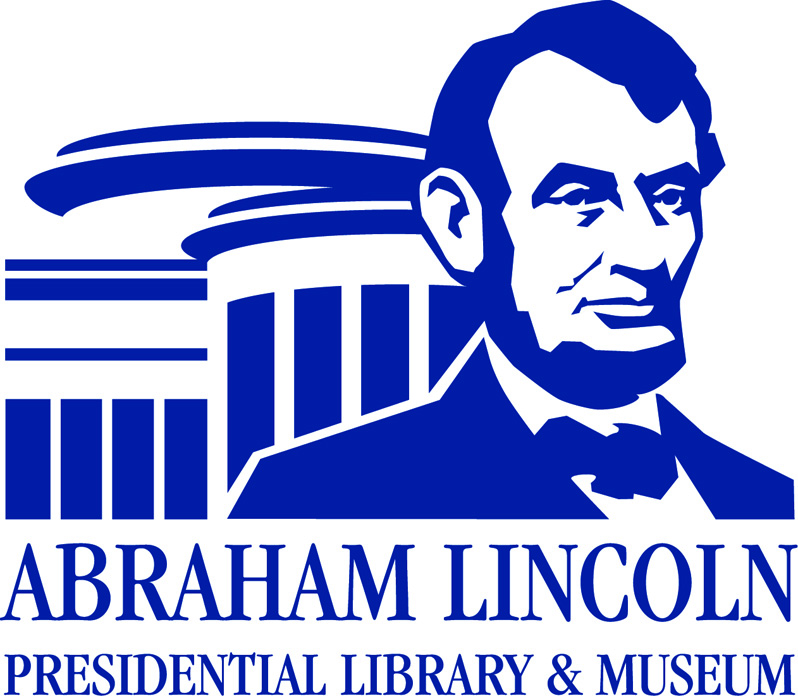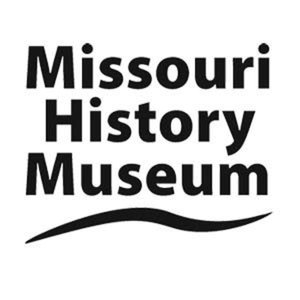Items in Remembering Lincoln that are transcribed.
from Apr. 17, 1865
Gardner Brewer to Alexander
-
Full Title
Gardner Brewer to Alexander
-
Description
Wealthy Boston merchant Gardner Brewer writes to a "Mrs. Alexander" about Lincoln's assassination and its impact on the nation and the war.
-
Transcription
Boston, M. S. April 17, 1865.
Dear Mrs. Alexander
I had this pleasure a week ago, when Everything appeared bright and promising and all were in bouyant, Exultant spirits, but in a moment Everything has been Changed. Thinking that Jan and Mr. Alexander might at first feel apprehensive and despondent, I write to endeavor to persuade Jan to take a more cheerful view of our prospects; not that I am the less appalled or grieved by the shocking calamity which has deprived the nation of the services of a true and honest patriot at a moment when he was so much needed. I participate with almost all in the feelings of rage at this most atrocious act; but the nation does not depend upon the life of any one man or set of men, and I think Jan will be convinced upon reflection that we shall proceed Equally prosperously under the new administration as we shoud under the old. The effect of this murder will be not only greater union throughout the North, which was not needed, but it will intensify the resolution for energetic action and will cause the new administration to be sustained in Carrying out and vindicating the supremacy of the Laws. Perhaps good Mr. Lincoln had too much of the milk of human Kindness, and many fear that in pardoning indiscriminately nearly or quite all the leaders and participants in the rebellion, he would have done much towards Encouraging another attempt at some future day when we might be engaged in a foreign war, and at the moment of our greatest need, Numerous acts of clemency which did not appear in the newspapers were Circulated in private and Commented upon, and while all respected the Kindness of heart manifested they could not but have grave doubts of their expediency and fears for the results. There is no cause for apprehensions that Johnson will Err in expressing too much clemency. He will doubtless punish the leaders of the rebellion, and for me I sincerely hope he will. I consider it mistaken mercy on the part of Gen. Grant to have permitted that Cold, Calculating traitor Lee to escape so easily when he was in his power. You have doubtless shared in the mortification occasioned by the manner in which Johnson disgraced himself and the Country on the 4th of March. That was a terribly unfortunate accident, but it Certainly was an accident. I have the best authority for saying that he is not a drunkard. During the last two or three years his troubles and anxieties have been great, and he has taken Stimulants, but not to excess. He has now signed the pledge and made a solemn oath that if he is ever intoxicated again he will immediately afterwards resign his position. I have no fears, therefore, of his habits. He is a man of great strength of mind and of course possessed great natural ability, or he never could have obtained his present position. He is much esteemed and respected by those who have been with him a long time in the Senate, and they have no fears so far as his habits are Concerned. I admit that it is possible he may Err in great severity, but he will have able advisers in Mr. Seward (if his life is spared) as I think it will be,) and others, and I do not believe he will commit any rash or imprudent act, but that on the contrary our affairs, both foreign and domestic, will be conducted with the greatest prudence and skill. He will fear the newspapers and therefore will not comment upon the feeling which universably pervades the Community; but there is one remarkable feature. the most bitter opponents of Mr. Lincoln now deplore his loss even more, if possible, than his friends. Even Mr. Hillard, formerly one of the Editors of the Courier, who was hissed and not permitted to speak last Monday because he advocated Clemency Especially for Lee, could not restrain his tears when conversing with my brother on Saturday. To be sure he always was and is a kind hearted man, but it is so universally: the most bitter Copperheads feel as badly as the most staunch Republicans.
You will perceive that, as I predicted last week, Mobile has fallen, Perhaps before you read this, the telegraph will announce to you that Johnson's Army has surrendered. At all Events this is sure to occur.
The Confidence of the community in the change in the head of the Executive is shown by the absence of any change in that unerring thermometer, the gold market.
It will be difficult for you to realize the manifestations of grief. Almost every place of business and dwelling house, no matter how humble, has some Emblem of mourning, and the stores and houses of the more wealthy vie with Each other in the Elaborateness of the display. The only limit seems to be obtaining sufficient black material, which is nearly exhausted.
I Enclose newspaper slips which I thought you would find interesting, supposing you may receive them before newspapers Come to hand, some of which may not meet your Eye. I would call your attention particularly to "Carletous" account of the surrender of Lee, and I hope the places named may be found upon your maps.
Your Kind note sent through Mr. Hales was received a few days since and he very Kindly permitted me to send your Exceedingly interesting letter to him. Mrs. Brewer, Carrie and myself feel very grateful for your kind sympathy. You can hardly imagine how deep was our anxiety when it seemed as though we had scarcely any ground for hope. You perhaps may judge how Critical the Case was when I tell you that Dr Warren visited Mrs. B. three times a day and Dr Holmes Every other day in consultation, he having attended her mother and sister as well as his own wife, Mrs. Brewer's niece all of whom died of different internal maladies; and Dr Holmes Especially took the gloomiest possible view. He not only gave me no Encouragement, but so far as it was possible to gain an opinion it was decidedly that he had no hope. Dr Warren on the contrary, in the outset stated his theory which he always adhered to and which in the End proved correct, qualifying it however by saying that it was impossible for human sagacity to determine positively the cause, She is now so well as to be able to walk into the next room and sit up three or four hours Every day. The first mild pleasant day she is to be Carried down stairs to take a short drive. We leave for Newport the middle of June and we hope that by passing a very quiet Summer her health may be perfectly restored.
You may Expect a great rash of travellers from this side. Almost Every one is going. Nearly all the staterooms in the steamers are Engaged for two or three months. But I must conclude; and with Kindest regards to yourself and Mr. Alexander and your daughter I am,
Very respectfully and sincerely,
Your friend,
Gardner Brewer
April 18th Gold on Friday (14th) 145 today 146 3/4. -
Source
Gardner Brewer Letters
-
Rights
The Abraham Lincoln Presidential Library and Museum holds all rights and permissions.
-
Tags
-
Cite this Item
Brewer, Gardner, 1806-1874. "Gardner Brewer to Alexander". Abraham Lincoln Presidential Library and Museum. Remembering Lincoln. Web. Accessed December 15, 2025. https://rememberinglincoln.fords.org/node/699
from Apr. 17, 1865
Gardner Brewer to Alexander
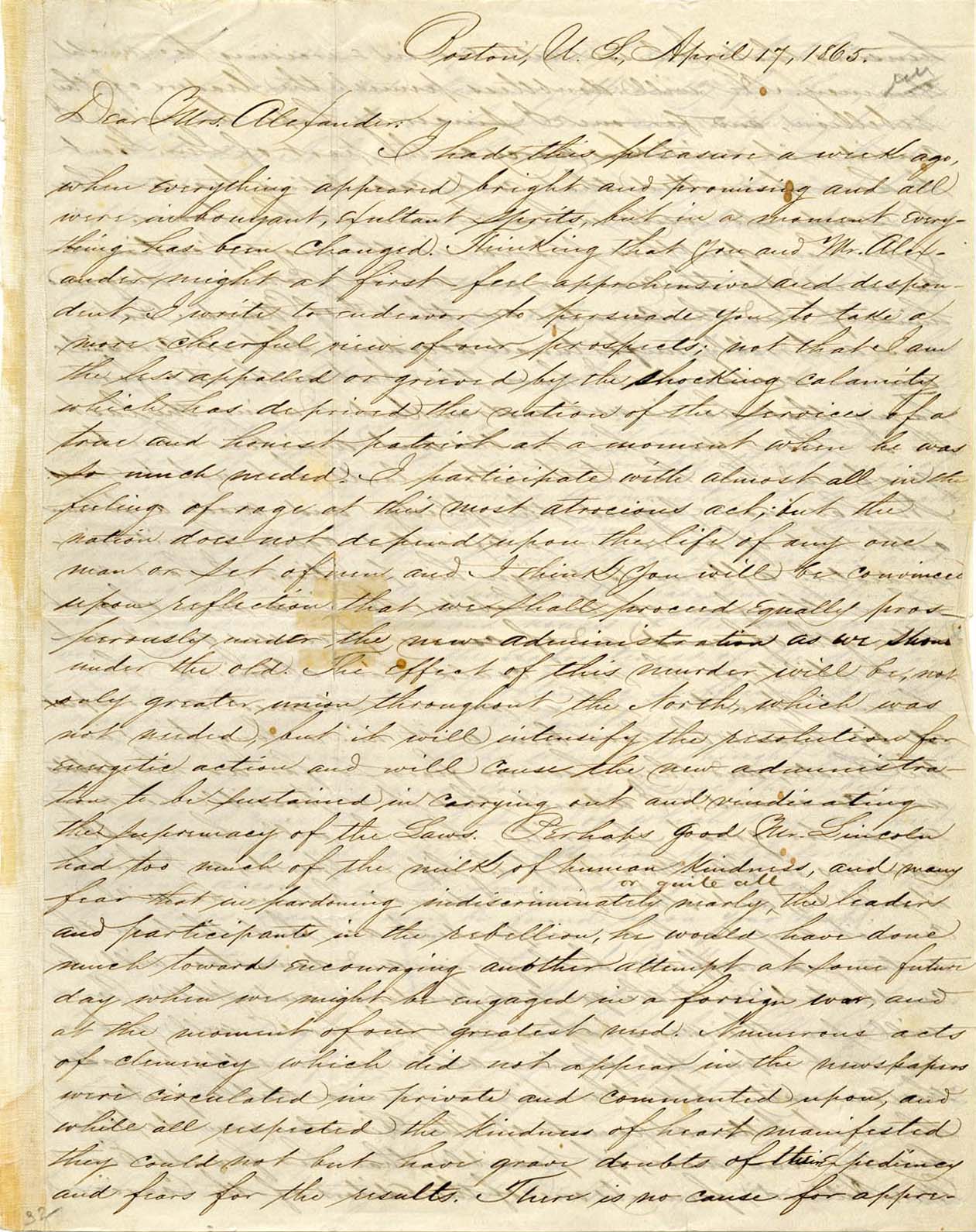
-
Description
Wealthy Boston merchant Gardner Brewer writes to a "Mrs. Alexander" about Lincoln's assassination and its impact on the nation and the war.
-
Source
Gardner Brewer Letters
-
Rights
The Abraham Lincoln Presidential Library and Museum holds all rights and permissions.
-
Creator
Brewer, Gardner, 1806-1874
-
Publisher
Abraham Lincoln Presidential Library and Museum
-
Date
April 17, 1865
-
Material
paper and ink
-
Dimensions
41 x 27 cm
from Apr. 25, 1865
Preston King to Unknown
-
Full Title
Preston King to Unknown
-
Description
Preston King, a former U.S. Senator from New York, comments on the shock and grief gripping the nation in the wake of the assassination of President Lincoln. King also expresses his confidence in President Andrew Johnson.
-
Transcription
Lincoln
Washington April 24 1865.
My Dear Sir
Your letter and the paper are recd, for which accepting thanks. It is difficult to realize that the Horrible crime which has filled the Whole Country with Greif is a fact. I have to say even in the midst of the mourning visible in every face that I fully beleive the confidence so universally expressed in Mr. Johnson is well founded
Yours Truly,
Preston King -
Source
Preston King Letter
-
Rights
The Abraham Lincoln Presidential Library and Museum holds all rights and permissions.
-
Tags
-
Cite this Item
King, Preston, 1806-1865. "Preston King to Unknown". Abraham Lincoln Presidential Library and Museum. Remembering Lincoln. Web. Accessed December 15, 2025. https://rememberinglincoln.fords.org/node/698
from Apr. 25, 1865
Preston King to Unknown
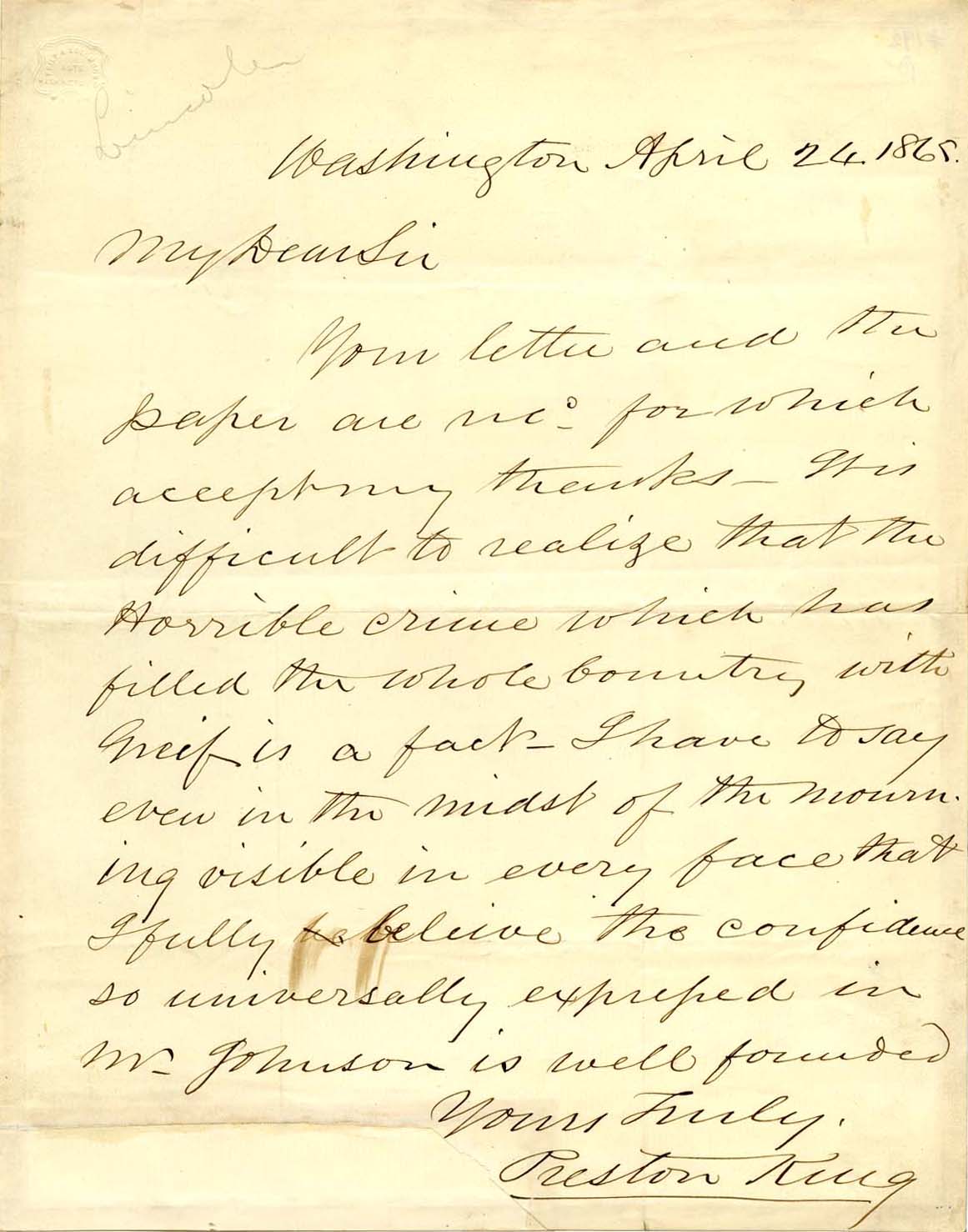
-
Description
Preston King, a former U.S. Senator from New York, comments on the shock and grief gripping the nation in the wake of the assassination of President Lincoln. King also expresses his confidence in President Andrew Johnson.
-
Source
Preston King Letter
-
Rights
The Abraham Lincoln Presidential Library and Museum holds all rights and permissions.
-
Creator
King, Preston, 1806-1865
-
Publisher
Abraham Lincoln Presidential Library and Museum
-
Date
April 25, 1865
-
Material
paper and ink
-
Dimensions
20 x 25 cm
from May. 12, 1865
Dudley Avery to Daniel D. Avery
-
Full Title
Dudley Avery to Daniel D. Avery
-
Description
Dudley Avery, the son of a Louisiana plantation owner and a former Confederate soldier, wrote his father (who had relocated to Texas when Union troops occupied the plantation earlier in the Civil War) to express his thoughts on the Lincoln assassination. He feared that President Andrew Johnson would be much more harsh on Confederates than Lincoln would have been--a fear that later proved unfounded: "My views in regar to the assassination of Lincoln are the same as yours. I think that in the present condition of the Country it is a misfortune to the South. Johnson seems to be a man void of principle and honor and if he is not restrained by the Conservative party at the North, he will out Herod, Herod. Next to our being subjugated I regard his being raised to supreme command our greatest calamity."
-
Transcription
Petit Anse Island
May 12th 1865
My dear Papa,
The perusal of your kind letter forwarded by Mr. Weeks gave me much pleasure, but I was distressed at the same time to find you had received so few of my letters. Uncle Henshaw returned from New Orleans some three weeks since and immediately wrote you a long letter which I forwarded by way of Shreveport. He brought us the news of Lee's surrender and wrote advising your immediate return home. In a few, short weeks all of our bright hopes for the future of our Country have been blasted: the most gigantic struggle of any people for their independence has proved unsuccessful and our Government has crumbled to the dust, burying in its fall the only remnants of liberty left this distracted country. As a mighty Ship with fair winds, her port almost in sight, her crew filled with hope and expectation, is sent by a squall, to the bottom, with all sails set, so have we gone down. It behooves us to await with patience and hope, whatever the future may bring forth, to bear with fortitude and resignation what God's will may ordain and to battle manfully with the world for a position, and a support. Although the future is dark, it may not be as dark as we anticipate and should the States be allowed to come back with their sovereignty intact, we have much yet to hope for. Uncle Henshaw, with many others, thinks this will be the case. He has been among the Yankees and his judgement is probably more correct than either yours or mine. The Yankees have not recognized the bogus government of Welles and it is probable that the whole people of the state will be allowed to choose their executive officer. My views in regar to the assassination of Lincoln are the same as yours. I think that in the present condition of the Country it is a misfortune to the South. Johnson seems to be a man void of principle and honor and if he is not restrained by the Conservative party at the North, he will out Herod, Herod. Next to our being subjugated I regard his being raised to supreme command our greatest calamity. I hope that dear Mama has returned ere this, if she has not, do you not think advisable for her to return by way of New Orleans. From Havannah she could to Mr Lacy in New Orleans, who would obtain her a pass to go to New Iberia. Ladies come through the lines every day without dificulty. The lines in parts have been opened by the Yankees. I hope however that Ma is now with you and that dear Sister's health was improved by the sea voyage. If you see no prospect of Ma's return to Houston, do you not think it better that you should come home at any rate? Everything here is progressing well under the circumstances as you could wish. If I had more mules at my command I could plant more corn, but at present this is impossible. Make every effort to get that powder here. There will be great demand for salt this summer. It is now selling for six dollars a sack in New Orleans. I deposited all the money I had on hand with Uncle Henshaw. Some think the State Money will be redeemed. This I consider rather doubtful. I endeavoured to sell it here, but was unsuccessful. I am much obliged to you for the flannel and cloth sent over in the trunk. The flannel will make me an excellent summer suit. The coton is unbleached and is too coarse I think for sheeting. Mr. Robinson brought me the axes a few days since. Old Labra has a fine garden and has planted most of the seed you sent over. Mrs. Richardson had previously been kind enough to give me a good many seed. I send you by Mr. Weeks a very handsome pipe that was cared for me by Young Randolph. Please accept it as a very slight token of the love I bear you. I shall look for you home very soon. We have had fish almost every day but I fear the back water from the Mississippi will spoil the fishing. The Grand Levee has broken. Fausse Point and the whole Lafourche Country is under water. The Bayou Teche has been very high since last January and is now almost over its Banks. Louise joins me in much love to Sisters Mary and Minnie, Brother and yourself.
With devoted love,
Your Son,
Dudley
-
Source
Avery Family Papers, Records of the Antebellum Southern Plantations, Series J, Part 5, Reel 11, Frames 652-655
-
Rights
This item is published solely for personal research and nonprofit educational use under the terms of fair use. No copyright in the item is asserted or implied by its publication here.
-
Tags
-
Cite this Item
Dudley Avery. "Dudley Avery to Daniel D. Avery". Published online by W. Caleb McDaniel, Rice University. Remembering Lincoln. Web. Accessed December 15, 2025. https://rememberinglincoln.fords.org/node/696
-
Creator
Dudley Avery
-
Publisher
-
Date
May 12, 1865
from May. 12, 1865
Dudley Avery to Daniel D. Avery
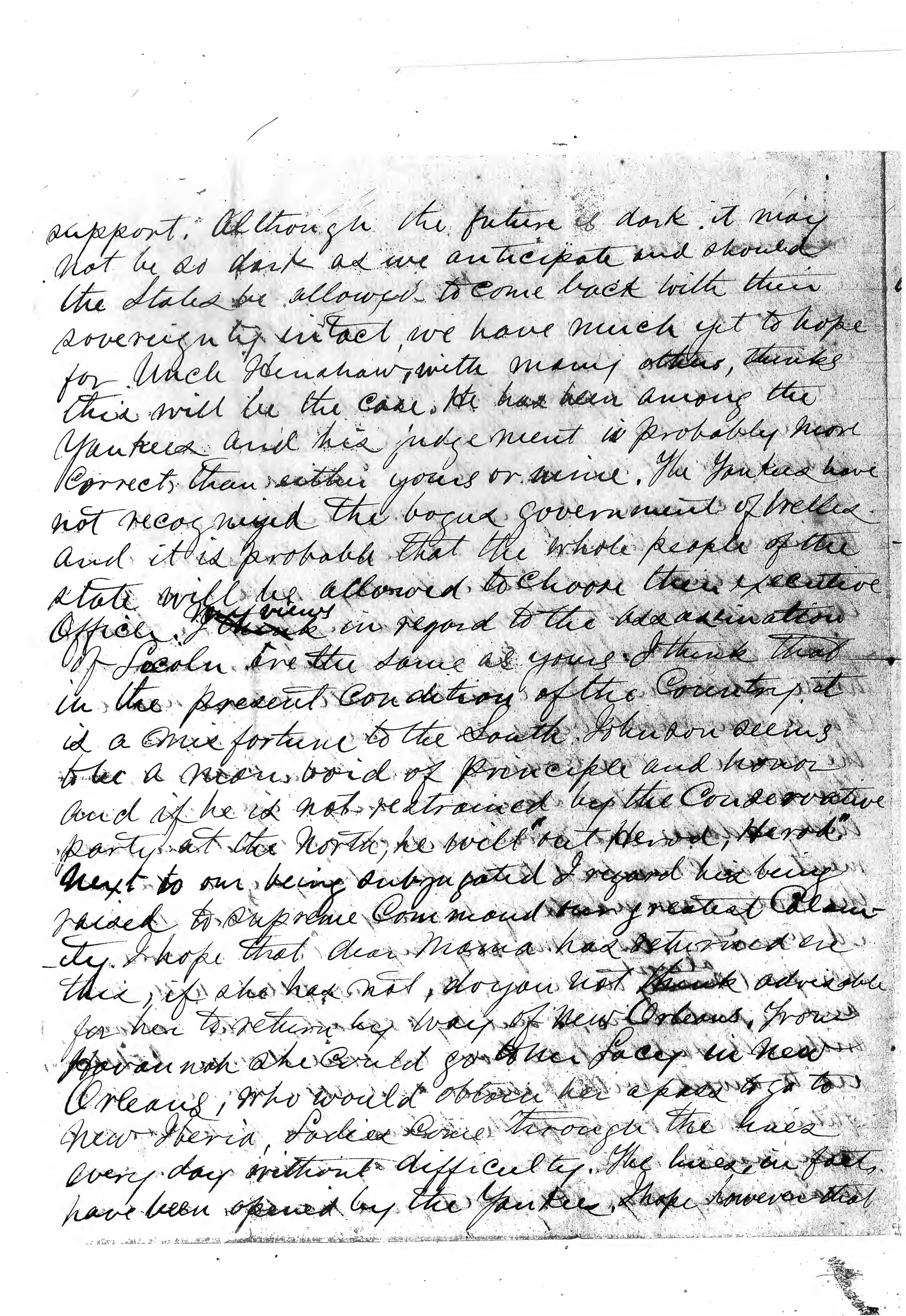
-
Description
Dudley Avery, the son of a Louisiana plantation owner and a former Confederate soldier, wrote his father (who had relocated to Texas when Union troops occupied the plantation earlier in the Civil War) to express his thoughts on the Lincoln assassination. He feared that President Andrew Johnson would be much more harsh on Confederates than Lincoln would have been--a fear that later proved unfounded: "My views in regar to the assassination of Lincoln are the same as yours. I think that in the present condition of the Country it is a misfortune to the South. Johnson seems to be a man void of principle and honor and if he is not restrained by the Conservative party at the North, he will out Herod, Herod. Next to our being subjugated I regard his being raised to supreme command our greatest calamity."
-
Source
Avery Family Papers, Records of the Antebellum Southern Plantations, Series J, Part 5, Reel 11, Frames 652-655
-
Rights
This item is published solely for personal research and nonprofit educational use under the terms of fair use. No copyright in the item is asserted or implied by its publication here.
-
Creator
Dudley Avery
-
Publisher
-
Date
May 12, 1865
from Apr. 15, 1865
Dr. Moses Gage Diary
-
Full Title
Dr. Moses Gage Diary
-
Description
After calculating the time since he had last written, Dr. Moses Gage, a physician in Bethel, New York, expressed the emotional whiplash many Americans felt at hearing the news of Lincoln's assassination after celebrating the surrender of General Robert E. Lee five days earlier.
-
Transcription
After a lapse of thirty years, five months & twenty three days I open this book to mark a record more sad and distressing than the one with which I ended so many years ago, then my regrets were for a young friend who passed away in the spring time of life. Yesterday, Friday the 14th Abraham Lincoln President of the U.S. was assassinated in the city of Washington, at the time when we were all congratulating our selves that the slaveholders rebellion was nearly over, and when hope pointed to the bright future, when the glory of this republic was about to be revealed, the man who had did more than all others was stricken down by the hand of the Assassin;--The ways of Providence are inscrutable it may be for the [--] we will hope--The hand of an assassin stabbed Secretary Seward thrice & he too is probably dead before this time.
-
Source
Vance Gage
-
Rights
This item may be reproduced and used for any purpose, including research, teaching, private study, publication, broadcast or commercial use, with proper citation and attribution.
-
Tags
-
Cite this Item
Dr. Moses Gage. "Dr. Moses Gage Diary". Remembering Lincoln. Web. Accessed December 15, 2025. https://rememberinglincoln.fords.org/node/695
-
Creator
Dr. Moses Gage
-
Date
April 15, 1865
from Apr. 15, 1865
Dr. Moses Gage Diary
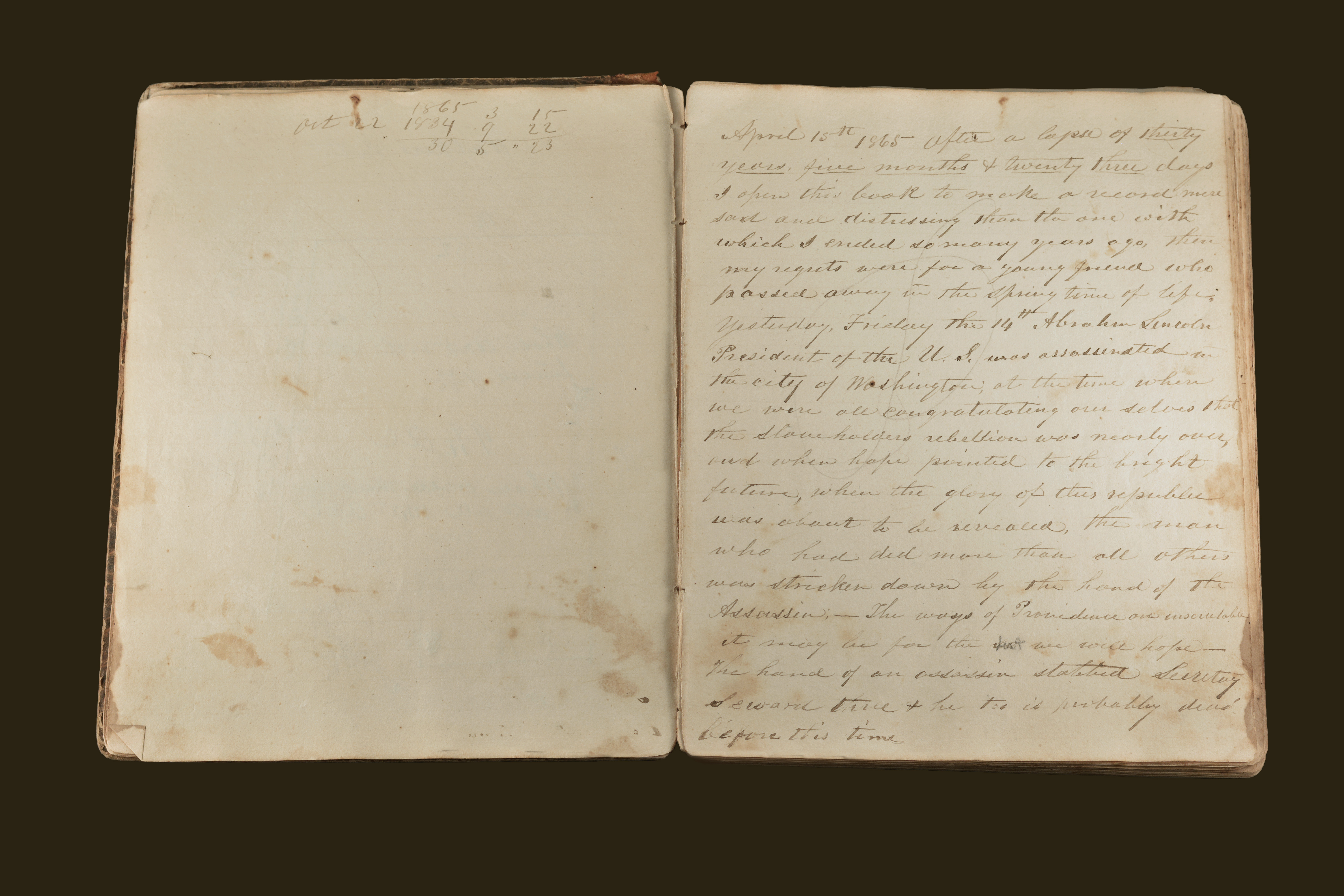
-
Description
After calculating the time since he had last written, Dr. Moses Gage, a physician in Bethel, New York, expressed the emotional whiplash many Americans felt at hearing the news of Lincoln's assassination after celebrating the surrender of General Robert E. Lee five days earlier.
-
Source
Vance Gage
-
Rights
This item may be reproduced and used for any purpose, including research, teaching, private study, publication, broadcast or commercial use, with proper citation and attribution.
-
Creator
Dr. Moses Gage
-
Date
April 15, 1865
from Apr. 30, 1865
Horatio Nelson Taft Diary, April 30, 1865
-
Full Title
Horatio Nelson Taft Diary, April 30, 1865
-
Description
Patent examiner Horatio Nelson Taft discussed the events of the previous month, calling April 1865 "the most eventful in the History of our Country."
-
Transcription
April 30th 1865
This has been a most eventful month. The most eventful in the History of our Country. We have seen during this month the complete crushing out of the “Great rebellion” by a series of masterly Military achievements. The occupation of the Rebel Capitol by our troops. The surrender of Genl Lee with his Army near Richmond, and the surrender of Genl Johnson and his Army in North Carolina, and above all in importance which has occured in the World during this month, The President of the United States has been assassinated. Abraham Lincoln, the good and kind hearted, was Shot while sitting in his Box at Fords Theatre on the night of the 14th Int at about half past ten O'clock. Mr Lincoln had been in the habit of attending the Theatre occasionaly, perhaps once in four or six weeks, as a relaxation from the arduous duties of his position and constant mental exertion. On this occasion he went rather reluctantly. But it had been published in the Bills that Himself and Genl Grant would be present, and Genl Grant having left the City in the evening train for Phila, the President said that he did not “wish the people to be disappointed” and so went with his Lady arriving about ½ past 8. Miss Harris (daughter of Hon Ira Harris) and Maj Rathbone of Albany were also in the same Box, which was a double one, two being thrown into one. This Box was in the 2nd Tier and entered from the Dress circle through a narrow corridor some three feet wide and eight or ten long. There was a door at the dress circle end and at the other end there were two doors, one for each Box but now the two Boxes being thrown into one, one of the doors was closed. The other was open, and all of them unguarded. The assassin J Wilkes Booth had made his arrangements in the most deliberate manner (probably during that day). He had fixed a bar across the door leading into the dress circle and had cut a hole through the closed door leading to the Box, which enabled him to see the exact position of the President and others in the Box without being seen himself. At about ½ past 10, he entered the corridor from the Dress circle, bared the door to prevent any one from entering, examined the position of Mr Lincoln through the hole in the closed door. Then entered the Box behind all who were there (as they were looking toward the stage) and standing within three or four feet of Mr Lincoln, Shot him in the back of the head. The ball entering about two inches from the left ear near the base of the skull and lodging in the brain about two inches back of the right eye. His head was probably inclined forward at the time. The Murderer rushed to the front of the Box with a dagger in his hand. Major Rathbone caught his coat but Booth struck him on the arm with the dagger wounding him severely, which compelled him to let go his hold. Booth vaulted over the front of the Box and as he did so exclaimed “Sic Semper Tyranis” (Thus To Tyrants). As he Jumped from the box his spur cau[gh]t in the flag and as he struck the to see the exact position of the President and others in the Box without being seen himself. At about ½ past 10, he entered the corridor from the Dress circle, bared the door to prevent any one from entering, examined the position of Mr Lincoln through the hole in the closed door. Then entered the Box behind all who were there (as they were looking toward the stage) and standing within three or four feet of Mr Lincoln, Shot him in the back of the head. The ball entering about two inches from the left ear near the base of the skull and lodging in the brain about two inches back of the right eye. His head was probably inclined forward at the time. The Murderer rushed to the front of the Box with a dagger in his hand. Major Rathbone caught his coat but Booth struck him on the arm with the dagger wounding him severely, which compelled him to let go his hold. Booth vaulted over the front of the Box and as he did so exclaimed “Sic Semper Tyranis” (Thus To Tyrants). As he Jumped from the box his spur cau[gh]t in the flag and as he struck the Stage he came to a crouching position from the effect of the concussion, his hands striking the floor but he recovered himself in a moment and flourishing his dagger he strode across the Stage some forty feet in sight of the spectators and past some of the actors, and reaching the back door which opens into a lane, he mounted a fleet horse and escaped. The lane enters F St betwen 9th & 10 Sts. The audience was paralized for some seconds, but rushed on to the Stage. A Surgeon was called for and Charles S Taft a Surgeon being present was lifted up from the Stage to the Box by those present. Before this the bar had been removed by Maj Rathbone and several men had reached the Box. When Chas reached the Box the President was lying upon the floor. Water and stimulants were used immediately but without avail in attempts to revive him. He was taken up and carried from the Theatre to the House opposite in
about fifteen minutes after he was shot. A Dr Leale from Armory Square Hospital was the first Surgeon in the box. But Chas did not know that there was any Surgeon but himself present until the President was removed from the Theatre. Chas had charge of him until Dr Stone (the Presidents family Physician) arrived which was half an hour after he was placed on a bed at the House of Mr Peterson, opposite. When the shot was fired Mrs Lincoln was sitting near her husband with her hand on his knee. She says she saw the flash and heard the report of the pistol, thinking it was in some way connected with the the Play. She leaned forward to see what it was, and then looked to Mr Lincoln to see where he was looking. He was sitting with his head droped down and eyes shut. She was not alarmed at this, he sometimes held his head in that way when in deep thought, but she put her hand on his forehead and he not stirring she put it on the back of his head and feeling it wet she immediately withdrew it covered with blood. She then screamed and that is the last she remembered that took place in the Theatre. She says, as she put her hand on his head she recollects that something suddenly brushed past her and rubbing off her Shawl. It was Booth as he jumped from the Box. The President made no noise, nor attempted to speak, nor Stirred a limb after he was shot, nor was he conscious for one moment from that time until he died. When his skin was touched or his hand was taken, there was a slight quiver or tremor of the muscles, but that was all. Mustard paste was applied nearly all over the body and stimulants were given as long as he could swallow in hopes to revive him but entirely without avail. His pulse ceased to beat at 22 minutes past Seven. Chas had his hand on his heart, he said it fluttered or trilled for 10 seconds longer. It was the opinion of the Surgeons that the wound would have killed most men instantly, or in a very few minutes. But Mr Lincoln had so much vitality that he lived nearly nine hours. There were four Surgeons in immediate or active attendance. Dr Stone, The Surgeon Genl Dr Barnes, The Assistant Surgeon Genl Dr Crane and Charles. Some others were present whose services were not required. Most of the members of the Cabinet were there all night. Chief Justice Chase and other distinguished men. Mr Senator Sumner with Robert Lincoln leaning on his shoulder near the head of the bed. Sec'y Stanton was active in giving directions and writing dispatches all night. Genl Meigs Stood at the door to keep out all who were not wanted or to see that the room was not crowded. The room is at the end of the entrance Hall about 9 feet by 15, with two windows and three doors, one door entering from the Hall, one at the left as you enter, opening to an open porch or piazza, and the other at the farther end of the room, opening into another small room from which stairs decended to to [sic] the Basement. Some few individuals came in to the room through that door clandestinely. Mrs Lincoln occupied a room near by with some of her friends who were there. She went in frequently to see the President with Doct Gurley (The family Pastor) who had been sent for about 3 O'clock. She was not in the room when he died. Robert Lincoln was there and Dr Gurley, the two private Secretaries of the President Nicolay and Hay. Upon one occasion when Mrs L went in and saw her husband she fainted and was carried out insensible. It was thought best for her not to be there when he died. Dr Gurley prayed by the bedside of the President when he first arrived (at 3 o'clock). Then went into the room where Mrs Lincoln was and prayed with her, and remained with her most of the time, accompanying her and supporting her into the room of the dying President when she visited it. After the death Dr Gurley who was standing near Mr Stanton said shall we have any religious exercises here or elsewhere now? Yes said Mr Stanton offer Prayer ________ now and here. For the last half hour before the death, the utmost stillness had prevailed in the room, not a word, not a whisper was heard. The President of the United States dying, surrounded by his Cabinet and many of the first men in the Nation standing like statues around the bed presented a scene for an artist seldom equaled for solemn grandeur. It is to be hoped that it will yet be transfered to Canvass. After the President died Dr Gurley went to Mrs L and told her “the President is dead.” O - why did you not let me know? Why did you not tell me? “Your friends thought it was not best. You must be resigned to the will of God. You must be calm and trust in God and in your friends.” She soon after left, with Dr G for her Home. She was asked during the night if her son “Tad” (Thaddeus) (a boy about twelve years old) should be sent for. “O, my poor “Taddy” what will become of him? O do not send for him, his violent grief would disturb the House.” When they reached the Presidents house “Tad” met them on the Portico. “Where is my Pa? Where is my Pa? He kept repeating the question till they got into the room of Mrs Lincoln. He had heard that his Pa had been shot but evidently expected him when his mother came. He was very much excited and alarmed but had not thought that his Pa could be dead. “Taddy” your Pa is dead” said Dr Gurley. He was not prepared for this. He screamed in an agony of grief “O what shall I do? What shall I do? My Brother is dead. My Father is dead. O what shall I do? What will become of me? O what shall I do? O mother you will not die will you. O don't you die Ma. You wont die will you Mother? If you die I shall be all alone. O dont die Ma.” Dr Gurley said that up to that time he himself had not shed a tear, but he could not witness “Tads” grief unmoved and the Tears flowed freely. He said, when I got back to my own house at about 10 o'clock that morning, “I felt as though I had been engaged all night in a terrible Battle and had but just strength enough left to drag myself off the field.” -
Source
-
Rights
This item is in the public domain and may be reproduced and used for any purpose, including research, teaching, private study, publication, broadcast or commercial use, with proper citation and attribution.
-
Tags
-
Cite this Item
Horatio Nelson Taft. "Horatio Nelson Taft Diary, April 30, 1865". Remembering Lincoln. Web. Accessed December 15, 2025. https://rememberinglincoln.fords.org/node/691
-
Creator
Horatio Nelson Taft
-
Date
April 30, 1865
from Apr. 30, 1865
Horatio Nelson Taft Diary, April 30, 1865
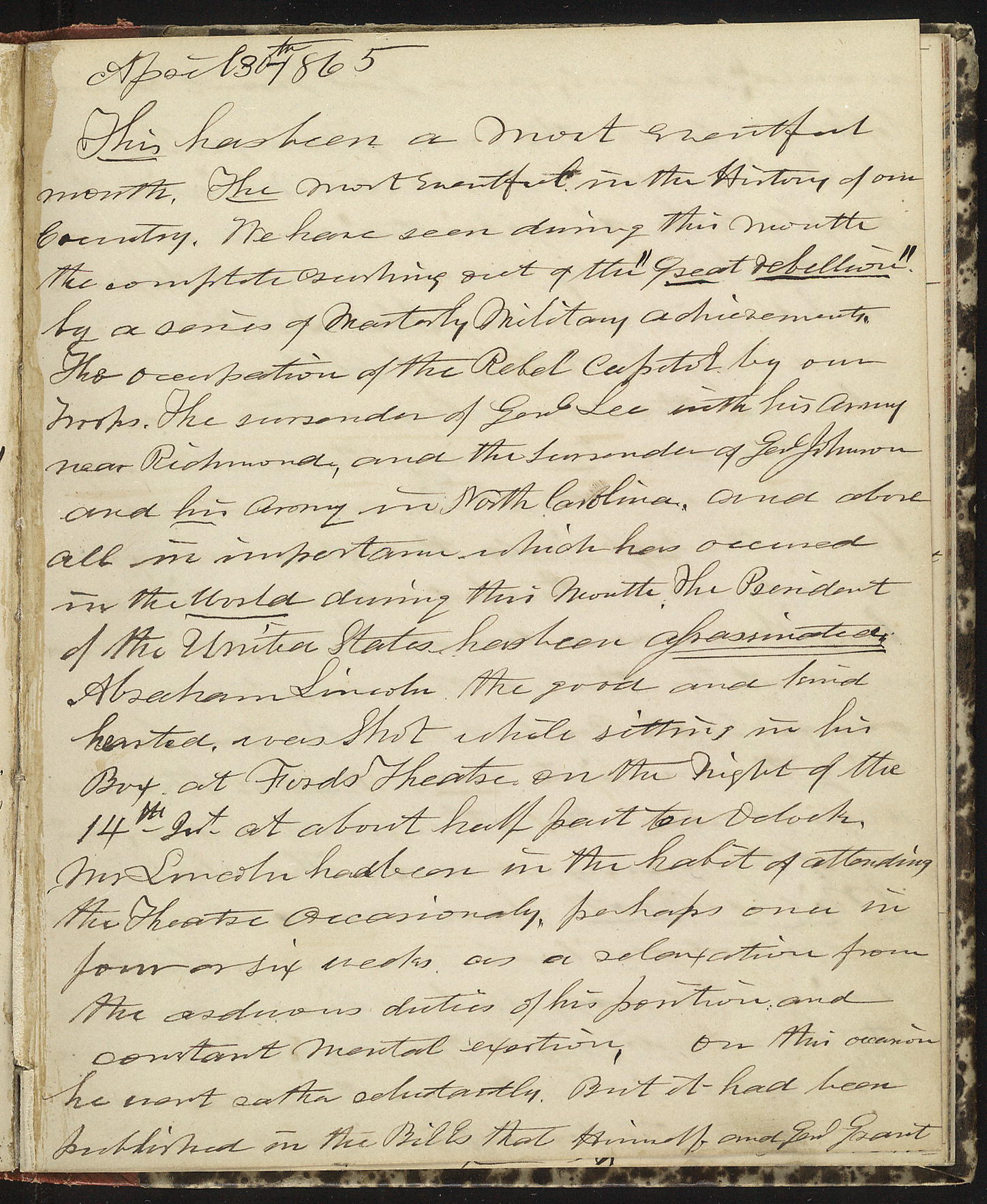
-
Description
Patent examiner Horatio Nelson Taft discussed the events of the previous month, calling April 1865 "the most eventful in the History of our Country."
-
Source
-
Rights
This item is in the public domain and may be reproduced and used for any purpose, including research, teaching, private study, publication, broadcast or commercial use, with proper citation and attribution.
-
Creator
Horatio Nelson Taft
-
Date
April 30, 1865
from May. 30, 1865
Horatio Nelson Taft Diary, May 30, 1865
-
Full Title
Horatio Nelson Taft Diary, May 30, 1865
-
Description
Patent examiner Horatio Nelson Taft reflected on the events of the first five months of 1865.
-
Transcription
Washington May 30th 1865
The achievements of the Country during the past six or seven months, if we take a rapid glance at them, are truly astonishing. A catalogue merely of the striking Military events during that period would almost fill a volume. Beginning with the time that Thomas almost annihilated the army of the Rebel Genl Hood at Franklin and Nashville. Then following Genl Sherman in his daring plunge into the heart of Georgia. The Storming of Fort McAllister, and the Capture of Savannah, almost without a Siege, with all its Wealth and vast Armaments. Then sweeping through South Carolina like a desolating Tornado. Compelling the Surrender of Charleston tho not within a hundred miles of it. Capturing the Capital of the State without a Battle (Columbia). Entering North Carolina, defeating the Rebels under Johnston at Bentonville and Averysboro and capturing the Capital of the State Raleigh and to close this successful march receives the surrender of Johnston and his Army. During this time, the month of March, Genl Terry captures Fort Fisher at the mouth of the Cap[e] Fear River (one of the most desperate and heroic acts of the War). Thus compelling the surrender of Willmington a few days afterwards. During this time also Schofield was fighting betwen Wilmington and Raleigh around Kinston and penetrating to Goldsboro. It is now the latter part of March and Genl Grants Movements begin to absorb the attention of the Country. The rebels surprise and capture Fort Steadman (one of Grants line of Forts) but dearly did it cost them for they were easily driven away. And then began those decisive movements and series of splendid victories which compelled the surrender of Petersburgh and Richmond and finaly the Capture of Genl Lee and his whole army, and the Great Rebellion was virtualy ended. But during this time again, Genl Canby was forcing his way into Mobile. Genl Wilson is “riding free” with a Cloud of horsemen over Alabama and Georgia scattering all opposition, capturing Selma, Montgomery, and Macon. Stoneman is dashing through Eastern Tennessee and N Carolina, riding at will and driving all before him. Then Taylor and Kirby Smith Surrender which embrace about the last of the rebel forces. But during this period of Six or Seven months, the realy most important events have not been yet mentioned. In the midst of a desolating War, in the smoke and heat of Battle as it were, There has been a quiet Presidential Election and Inauguration, with all its usual attendant excitements. A Draft of three hundred thousand men has been ordered, and the men raised. The Government Credit has been increased at home and abroad a hundred fold and Gold has fallen a hundred percent. Our great and Good President has been assassinated. The assassin Killed. Jefferson Davis has been captured and impeached for Treason. The grand Review & the Trial of the conspirators. Tearfully - and Joyfully have we witnessed these Events.
-
Source
-
Rights
This item is in the public domain and may be reproduced and used for any purpose, including research, teaching, private study, publication, broadcast or commercial use, with proper citation and attribution.
-
Tags
-
Cite this Item
Horatio Nelson Taft. "Horatio Nelson Taft Diary, May 30, 1865". Remembering Lincoln. Web. Accessed December 15, 2025. https://rememberinglincoln.fords.org/node/690
-
Creator
Horatio Nelson Taft
-
Date
May 30, 1865
from May. 30, 1865
Horatio Nelson Taft Diary, May 30, 1865
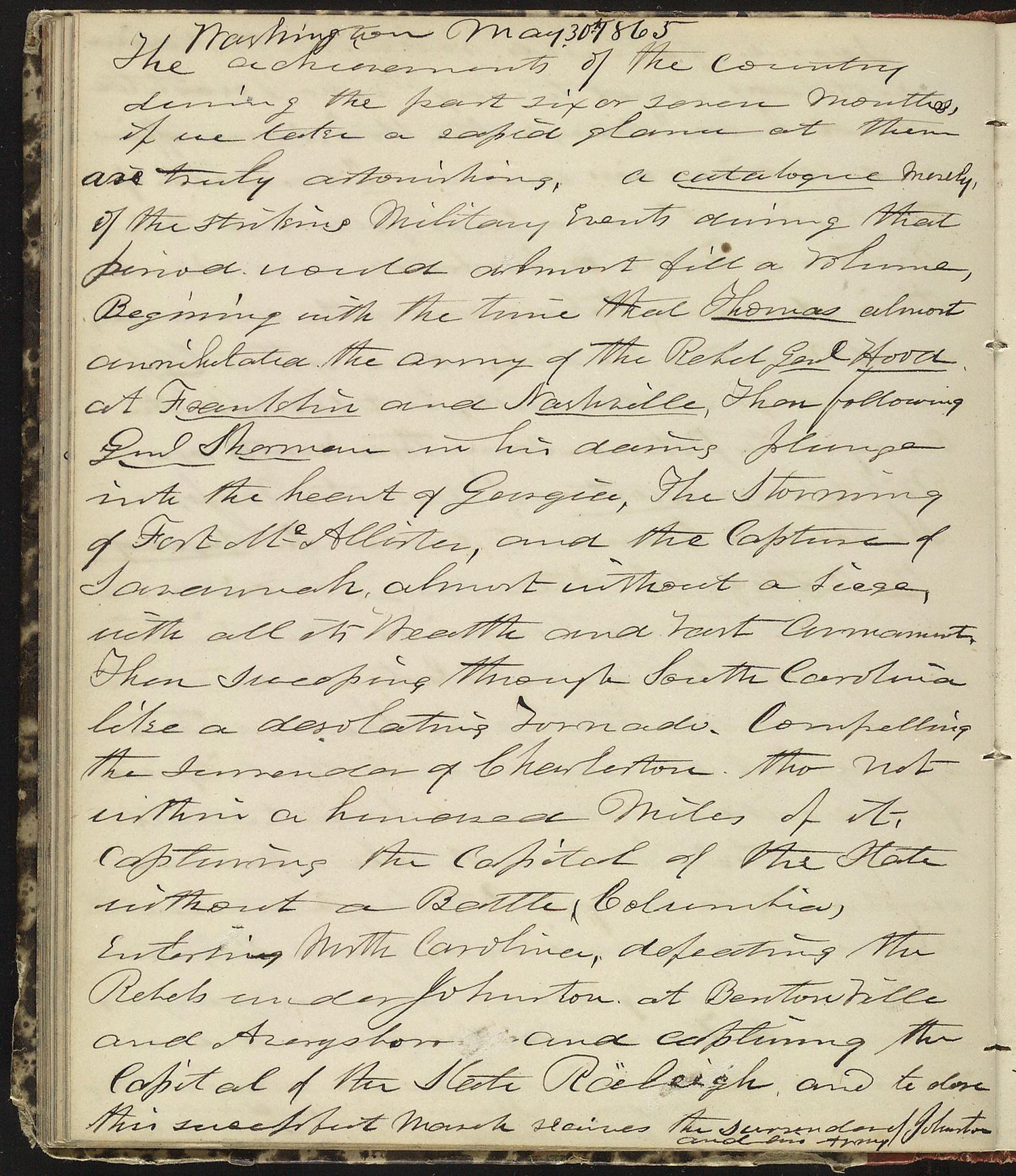
-
Description
Patent examiner Horatio Nelson Taft reflected on the events of the first five months of 1865.
-
Source
-
Rights
This item is in the public domain and may be reproduced and used for any purpose, including research, teaching, private study, publication, broadcast or commercial use, with proper citation and attribution.
-
Creator
Horatio Nelson Taft
-
Date
May 30, 1865
from Apr. 18, 1865
Unsigned Note to George Harrington, April 1865
-
Full Title
Unsigned Note to George Harrington, April 1865
-
Description
Suggests that as few carriages as possible be allowed in the funeral procession of Abraham Lincoln so that more persons may follow the President to his grave.
-
Transcription
Hon. Geo Harrington
Sir:
Pardon me for suggesting that as few carriages as possible ought to be allowed in the funeral cortege of the President.
There are one hundred thousand aching hearts, that will follow his remains to the grave. This cannot be done if long lines of vehicles occupy the space, without adding to the volume of humanity desirous of participating.
Unless care be taken in this respect, the remains will [arrive] at the place of burial or deposite before the people move from the White House.
Affection
[Transcription by: Daniel Kynaston] -
Source
-
Rights
Please contact the Missouri History Museum at photo@mohistory.org for permission to publish this resource.
-
Tags
-
Cite this Item
anonymous. "Unsigned Note to George Harrington, April 1865". Remembering Lincoln. Web. Accessed December 15, 2025. https://rememberinglincoln.fords.org/node/678
from Apr. 18, 1865
Unsigned Note to George Harrington, April 1865
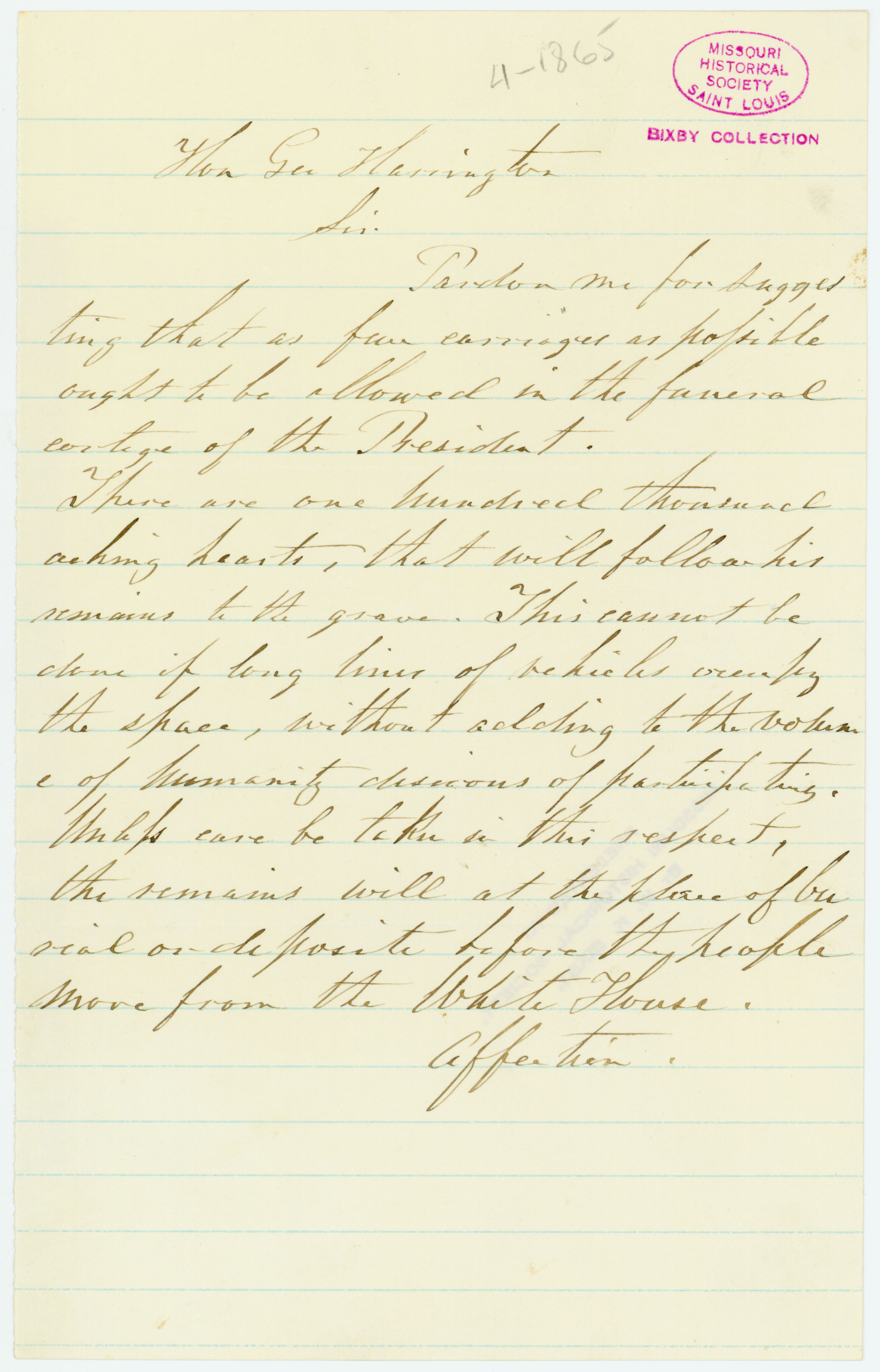
-
Description
Suggests that as few carriages as possible be allowed in the funeral procession of Abraham Lincoln so that more persons may follow the President to his grave.
-
Source
-
Rights
Please contact the Missouri History Museum at photo@mohistory.org for permission to publish this resource.
-
Creator
anonymous
-
Date
April 18, 1865
from Apr. 1, 1865
Diplomats Allowed to Attend Lincoln Funeral
-
Full Title
List of the Diplomatic Corps entitled to attend the funeral ceremonies of Abraham Lincoln, [April] 1865
-
Description
Lists diplomats and other dignitaries from various countries who were invited to attend the funeral of President Abraham Lincoln.
-
Transcription
List of the Diplomatic Corps
1865
Entitled to attend the Funeral Ceremonies
[Page 2]
Envoys Extraordinary and Ministers Plenipotentiary
Portugal. The Commander J.C. de Figaniere e Morao
Charlestown, Md
Prussia. Baron von Gerolt
Washington
Guatemala. Senor [Señor] Don Antonio José de Yrisarri [Irisarri]
Brooklyn, N.Y.
Spain. Senor Don Gabriel Garcia y Tassara
Corcorans Row. I. St.
Russia. Mr. Eduard de Stoeckle [Stoeckl]
Cor. I. & Connecticut Avenue
Costa Rica, Nicaragua & Honduras Senor [Señor] Don Luis Molina
F. st. bet: 20th & 21st sts.
Great Britain. Sir Frederick Bruce
245 H Street
Belgium. Mr. Alfred Berghuans.
Washington.
[Page 3]
Netherlands. Mr Roest van Limburg
N.Y.
Mexico. Senor Don Matias Romero.
h. 263 G Street.
Denmark. Mr. W.R. Raasloff [Raasløff]
29 Fifth Avenue
h. 46 Clinton Place, N.Y.
Italy. The Commander Joseph Butinatti.
At Mrs. Mackall’s, 7 Buildings.
Venezuela. Senor [Señor] Blas Bruzual
h. 35. West35th33rd Street, N. York
United States of Columbia [Colombia]. Genl. Eustorgio Salgar
Gramercy Park Hotel New York.
Sweden and Norway. Baron N.G. de Wetterstedt.
Washington
[Page 4]
Ministers Resident
Hanseatic Republics
Austria. Count Wydenbruck.
Washington.
[Page 5]
Chargés d’ Affaires
Chili [Chile]. Senor [Señor] Don F. Asta Buruaga.
Corcoran’s Row, I St.
Hayti [Haiti]. Mr. W. D. Bruno.
France. Mr. de Geofroy.
310. H. Street.
Liberia. John B. Pinney
New York
Peru. Senor José Antonio Garcia y Garcia.
Gramercy House, New York.
Hanseatic Republics. Dr. Johannes Rosing.
Corner 6th and D. streets.
Brazil. Senhor Ignacio de Avellar Barbosa [Barloza] de [da] Silva
Washington.
Hawaii. S.W. F. Odell.
Great Britain. J. Hurne Burnley
245. H. St.
Belgium. Mr. Alfred Berghmans.
Washington
[Page 6]
First Secretaries
Prussia. Baron Guido von Grabow, Georgetown.
Russia. Mr. Waldemar de Bodisco. do [Georgetown]
Italy. Mr. Henry Cora. Washington
Peru. Don Emilio Bonifaz. Gramercy Park Hotel N. York.
Mexico. Señor Don Ignacio Mariscal.
Spain. Señor Don Mariano de Potestad Wash.
Brazil. Senhor Luis Auguste de Padua Fleury.
Venezuela. Señor Florencio Ribas.
United States of Columbia [Colombia]. Señor Felipe Zapata.
Netherlands. Mr. A.P.C. Van Karnbeck [Karnebeek].
[Page 7]
Second Secretaries
Spain. Senor Don Luis de Potestad. Wash.
Russia. Mr. Alexander Davydov “
Great Britain. Francis Ottiwell Adams, Esq. “
Frederick Autrobus, Esq. “
France. Mr le Comte de Faverney “
M. de Minogues “
Mexico. Senor [Señor] Francisco D. Macin. “
Third Secretaries
Great Britain. R.T. G Kirkpatrick “
Edwin Constantine Henry Phipps “
Arthur Henry Seymour “
H. B. Smyth “
[Page 8]
Attaches
Portugal. Senhor G. J. de Fejaniere, Charlestown Md.
Spain. Señor Don Miguel de Bertodano, Washington
France. M. le Comte Grande Colbert “
M. Arthur de Pont “
Great Britain. The Hon. Thomas George Grosvenor “
Italy. Mr. R. Cantagalli
Venezuela. Commander José J. Roldan N. York
Senor Abraham I. Dorale “
United States of Columbia [Colombia]. Senor [Señor] Francisco Párraga “
Senor [Señor] Gustave F. Gonzales “
Chancellors
France. Mr Paul Dejardin Wash
--
[Transcription by: Patrick J. Lynch] -
Rights
This item is in the public domain.
-
Tags
-
Cite this Item
Harrington, George, 1815-1892. "List of the Diplomatic Corps entitled to attend the funeral ceremonies of Abraham Lincoln, [April] 1865". Remembering Lincoln. Web. Accessed December 15, 2025. https://rememberinglincoln.fords.org/node/675
from Apr. 1, 1865
List of the Diplomatic Corps entitled to attend the funeral ceremonies of Abraham Lincoln, [April] 1865
![List of the Diplomatic Corps entitled to attend the funeral ceremonies of Abraham Lincoln, [April] 1865](https://rememberinglincoln.fords.org/sites/default/files/225-List%20of%20Diplomatic%20Corps%2C%20page%201.jpg)
-
Description
Lists diplomats and other dignitaries from various countries who were invited to attend the funeral of President Abraham Lincoln.
-
Rights
This item is in the public domain.
-
Creator
Harrington, George, 1815-1892
-
Date
April 1, 1865
-
Material
from Apr. 18, 1865
Unsigned note to Hon. E.M. Stanton, [April 1865]
-
Full Title
Unsigned note to Hon. E.M. Stanton, [April 1865]
-
Description
States, "The running of cars upon the street railroads, between 17th street and the Congressional Cemetery, should cease to-morrow between 11 A.M., and to P.M. The rolling of cars, and the jingle of bells will contrast strangely with the solemnity of those several hours. . . ." Instructions for the day of Abraham Lincoln's funeral.
-
Transcription
[*4-1865*]
Missouri
Historical Society
Saint Louis
Bixby Collection
Hon E M Stanton
Sec of War
Sir
The running of cars
upon the street railroads, between
17th Street and the Congressional
Cemetery, should cease to-morrow
between 11 A M and 2 P M.
The rolling of cars, and the jingle
of bills will contrast strangely
with the solemnity of those sacred
hours.
Affection.
PRESENTED TO
MISSOURI HISTORICAL SOCIETY
BY W. K. BIXBY
[Transcription by Henry R.] -
Source
-
Rights
This item is in the public domain.
-
Tags
-
Cite this Item
anonymous. "Unsigned note to Hon. E.M. Stanton, [April 1865]". Remembering Lincoln. Web. Accessed December 15, 2025. https://rememberinglincoln.fords.org/node/680
from Apr. 18, 1865
Unsigned note to Hon. E.M. Stanton, [April 1865]
![Unsigned note to Hon. E.M. Stanton, [April 1865]](https://rememberinglincoln.fords.org/sites/default/files/230-Unsigned%20Note%20to%20Stanton%2C%20page%201.jpg)
-
Description
States, "The running of cars upon the street railroads, between 17th street and the Congressional Cemetery, should cease to-morrow between 11 A.M., and to P.M. The rolling of cars, and the jingle of bells will contrast strangely with the solemnity of those several hours. . . ." Instructions for the day of Abraham Lincoln's funeral.
-
Source
-
Rights
This item is in the public domain.
-
Creator
anonymous
-
Date
April 18, 1865
from Apr. 19, 1865
Admission Ticket to the White House
-
Full Title
Admission Ticket to the White House
-
Description
A black-bordered admission ticket to call at the White House during the official mourning period.
-
Transcription
EAST.
Admit the Bearer to the
EXECUTIVE MANSION,
On WEDNESDAY, the 19th of April, 1865
[Transcription by: Dr. Susan Corbesero, Ellis School, Pittsburgh, Pennsylvania] -
Source
-
Rights
This item is in the Public Domain.
-
Tags
-
Cite this Item
United States Government. "Admission Ticket to the White House". Remembering Lincoln. Web. Accessed December 15, 2025. https://rememberinglincoln.fords.org/node/682
-
Creator
United States Government
-
Date
April 19, 1865
-
Material
Paper
from Apr. 19, 1865
Admission Ticket to the White House
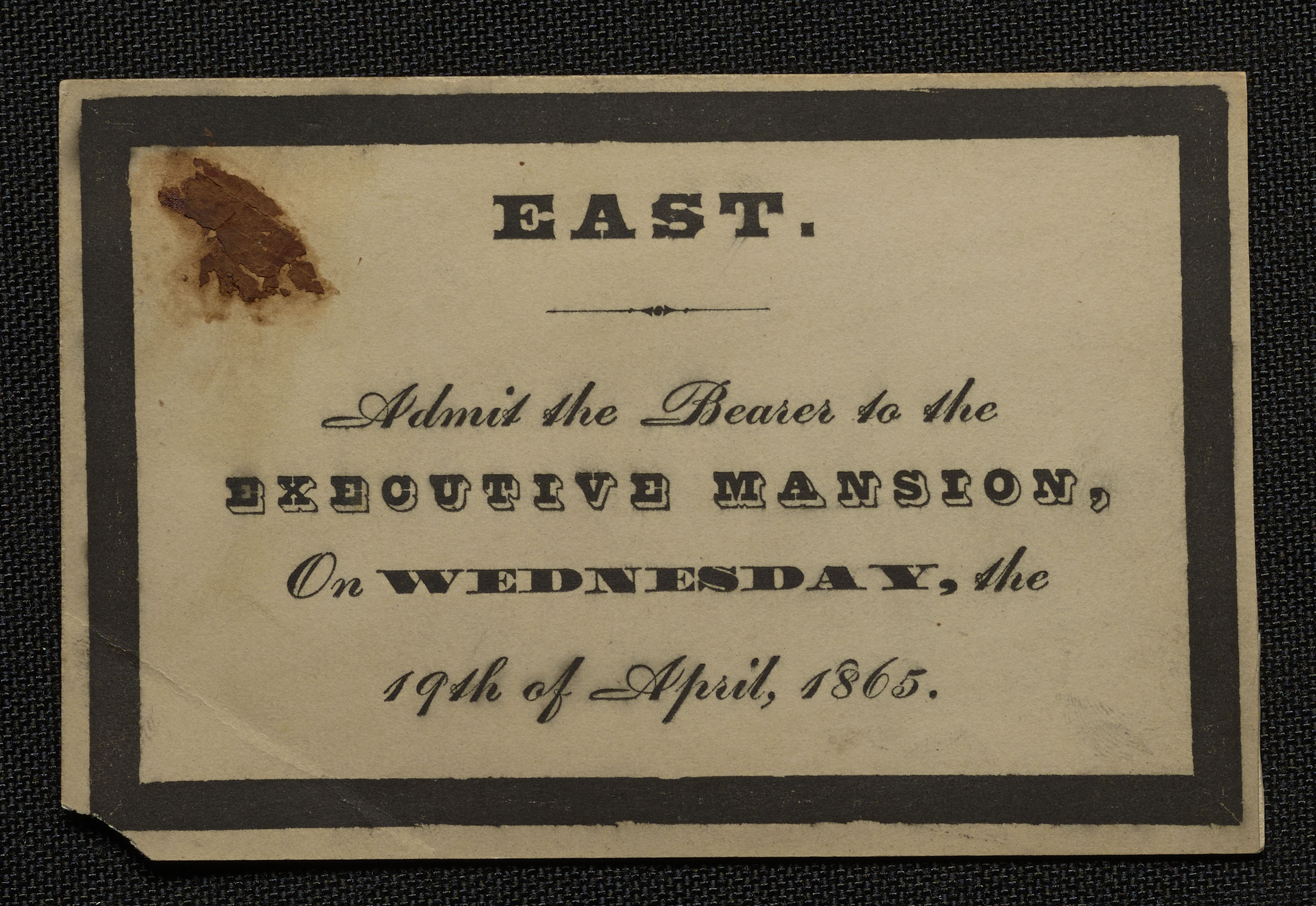
-
Description
A black-bordered admission ticket to call at the White House during the official mourning period.
-
Source
-
Rights
This item is in the Public Domain.
-
Creator
United States Government
-
Date
April 19, 1865
-
Material
Paper
